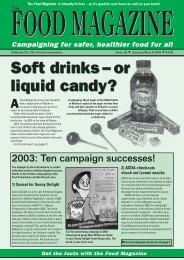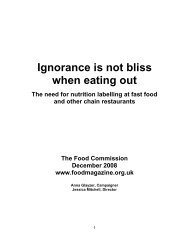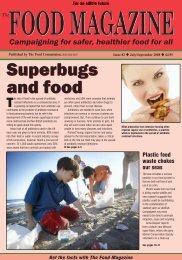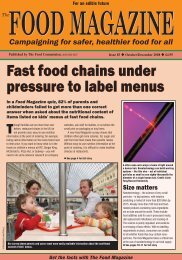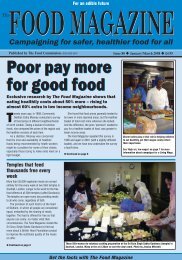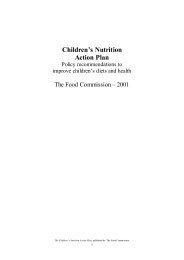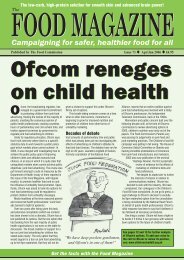Food Magazine - The Food Commission
Food Magazine - The Food Commission
Food Magazine - The Food Commission
Create successful ePaper yourself
Turn your PDF publications into a flip-book with our unique Google optimized e-Paper software.
science<br />
What the doctor reads<br />
<strong>The</strong> latest research from the medical journals<br />
Breastfeeding cuts<br />
diabetes risk<br />
A systematic review of studies of the effects of<br />
breastfeeding has shown several potential<br />
benefits for both mother and child with respect to<br />
the risk of diabetes. Breastfeeding lowers<br />
oestrogen levels in mothers, which may have a<br />
protective effect on glucose metabolism and<br />
subsequent risk of diabetes for those women. For<br />
the babies, having been breastfed for at least two<br />
months may lower the risk of diabetes in later<br />
childhood. Initial research has begun on the longterm<br />
effects of diabetes during pregnancy on<br />
children. Breastfeeding may lower both maternal<br />
and paediatric rates of diabetes. <strong>The</strong> review<br />
concludes that women with diabetes should be<br />
strongly encouraged to breastfeed because of<br />
maternal and childhood benefits specific to<br />
diabetes that are above and beyond other known<br />
benefits of breastfeeding.<br />
JS Taylor et al, 2005, J Am Coll Nutr. 24(5):<br />
320-6<br />
Weight gain is worse for<br />
women<br />
<strong>The</strong> links between excess bodyweight and risk of<br />
major chronic diseases are well-known but a<br />
new study has attempted to investigate the other<br />
side of the same question: what are the<br />
bodyweights of healthy people Data from over<br />
11,000 non-smoking men and women were<br />
classified according to their general health<br />
(based on self-reported health, medical history,<br />
Statins affect omega<br />
3:6 ratio<br />
Treatment of cardiac patients with cholesterollowering<br />
drugs may adversely affect their<br />
blood profiles for omega 3 and omega 6. A<br />
trial of the drug simvastatin showed omega 6<br />
fatty acid arachidonate rose but linoleate fell.<br />
Omega 3 remained unaffected. An alternative<br />
type of treatment, using the drug fenofibrate,<br />
had similar effects on the omega 6 fatty acids,<br />
and also led to a fall in omega 3 fatty acids<br />
alpha-linolenate and docosahexanoate.<br />
Compensating with more dietary omega 3<br />
may be helpful, say the authors.<br />
M de Lorgeril et al, 2005, Nutr Metab<br />
Cardiovasc Dis. 15(1): 36-41<br />
measurements of blood pressure, blood lipids,<br />
serum glucose, glycosylated haemoglobin, and<br />
lifestyle behaviour) and the distribution of the<br />
group’s body mass index (BMI) examined.<br />
<strong>The</strong> healthiest set had a median BMI of 24.5<br />
kg/m 2 for men and 21.5 kg/m 2 for women. <strong>The</strong><br />
proportion that were overweight was lowest<br />
among the healthiest women, but showed little<br />
difference between the healthiest men and those<br />
categorised as less healthy. Outright obesity was<br />
low among the healthiest men and women alike.<br />
KM Flegal, 2005, Int J Obes (online 27 Sept)<br />
School teaching doesn’t<br />
reduce obesity<br />
An educational intervention in schools in Austria<br />
to reduce the prevalence of obesity among<br />
children increased student knowledge of health<br />
but did not reduce their obesity levels. <strong>The</strong><br />
intervention was performed by a multiprofessional<br />
team and covered 11 nutrition and<br />
health-related sessions, one hour per week in<br />
each class. Children's initial poor nutritional<br />
knowledge improved significantly – with better<br />
results in grammar schools compared to<br />
comprehensive schools. However, BMI was not<br />
reduced in overweight children.<br />
S Damon et al, 2005, Acta Paediatr Suppl.<br />
94(448): 47-8<br />
Does breakfast help<br />
weight control<br />
A study of the eating habits and health of over<br />
4,000 adults in the USA has attempted to<br />
determine whether breakfast-eating helps<br />
maintain a healthy bodyweight. Breakfast<br />
consumers were more likely than breakfast<br />
avoiders to be older, female, white, nonsmokers,<br />
regular exercisers, and trying to control<br />
their weight.<br />
For women, daily energy intake was higher<br />
among breakfast consumers than among<br />
breakfast non-consumers; however those that<br />
ate breakfast were less likely to be overweight<br />
than those that did not. A key component<br />
appeared to be cereals – those women who<br />
usually ate ready-to-eat cereals were least likely<br />
to be overweight. For men, breakfast-eating<br />
appeared to have little relationship to their<br />
bodyweight.<br />
WO Song, 2005, J Am Diet Assoc. 105(9): 1373-82<br />
Obesity prejudice in<br />
medicine<br />
Obese people are less likely to receive<br />
preventive services, such as mammograms,<br />
cervical smears and flu vaccination from<br />
health care providers, according to<br />
researchers in the USA. For a sample of white,<br />
middle-class women, as BMI rose the odds of<br />
receiving check-up referrals went down. A<br />
normal-weight woman was 50% more likely to<br />
be referred for a mammogram screening than<br />
a severely obese woman.<br />
T Ostbye, 2005, Am J Public Health. 95(9):<br />
1623-30<br />
Omega 6 link to prostate<br />
growth<br />
Omega 6 fatty acids promote the growth of<br />
prostate tumour cells in laboratory cultures,<br />
researchers have found. <strong>The</strong> fatty acid appears<br />
to turn on a cascade of enzymes which leads to<br />
cell growth. Similar enzymes have been linked to<br />
colorectal cancer and some breast caners. <strong>The</strong><br />
study notes the change in the typical diet from a<br />
ratio of omega 6 to omega 3 of 1:2 before World<br />
War II to a ratio of 25:1 today. Prostate cancer<br />
incidence climbed steadily over the period.<br />
M Hughes-Fulford et al, 2005, Carcinogenesis.<br />
26(9): 1520-6<br />
Juice good for<br />
Alzheimer’s disease<br />
Antioxidants abundant in fruit and vegetable juices<br />
may help reduce the risk of Alzheimer’s disease.<br />
In a nine-year study of 1,800 older men and<br />
women, who were free of dementia at the start of<br />
the period, those who drank fruit or vegetable<br />
juice at least three times a week had a 75%<br />
reduced risk of developing the disease compared<br />
with those who drank juice less frequently.<br />
Dietary supplements of antioxidants C, E or<br />
beta-carotene appeared to have no effect. Fruit<br />
and vegetables were also less effective. <strong>The</strong><br />
authors suggest this may be because commercial<br />
juices often include the skin and pith of the fruit<br />
which would not usually be eaten (e.g. orange<br />
skin and pith), which contain valuable bio-active<br />
chemicals such as polyphenols.<br />
AR Borenstein, Alzheimer’s Association, 19 June<br />
2005 (aborenst@hsc.usf.edu)




